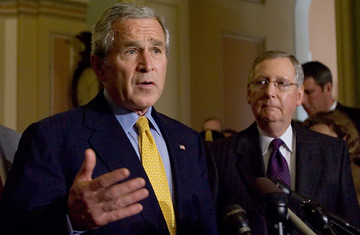
President George W. Bush talks to the media following a Senate Republican policy lunch to gather support for the immigration reform bill.
Bush was on Capitol Hill to convince Republicans to support the legislation, crafted painstakingly by 12 bipartisan negotiators and two cabinet members over the last five months. It is probably the last major piece of legislation Bush has a chance of passing as he approaches the lame-duck period of his Presidency. A majority of Republicans voted to halt debate on the bill last Thursday, sparking headlines that the legislation was dead. This week Bush and the 12 negotiators have worked hard to resurrect it, agreeing on lists of Republican and Democratic amendments they would allow to be voted on and tentatively scheduling floor time either concurrent to the energy debate now before the Senate or after it wraps next week.
Bush spent half his time at lunch listening to Senators like Sessions complain and the other half making an impassioned plea, telling Senators that the immigration problem has become one of national security. He also told the room about Marc Mares, the president of the Coast Guard Academy class of 2007, where Bush delivered commencement remarks on May 23. Even though Mares' grandfather might well have entered the country illegally, his grandson was well on his way to a life of distinguished public service. (It is a story Bush has mentioned in several speeches about immigration since.)
Some Senators were convinced to at least keep an open mind. Richard Burr of North Carolina and Jim Bunning of Kentucky — both of whom voted to shelve the bill last week — emerged from the room "open to listen to anything proposed." Senator John Thune, a South Dakota Republican who also opposed the measure last week, said he might be convinced to support the measure if his amendment — which would prioritize the securing of U.S. borders before giving any benefits to undocumented immigrants living in the U.S. — is included on the list of those to be considered. Bush "was very persuasive, very rational," Thune said. "He presented a coherent argument about why he thinks this is the right thing to do without getting all pushy."
Senate Minority Leader Mitch McConnell hailed the meeting as progress on a thorny issue. "I didn't expect anyone to stand up and holler they had an epiphany," McConnell said. "This bill is about 80 to 85% through on its way to the finish line."
Still, Sessions, for one, remained firm in his opposition. He replied to Bush's ribbing, saying "it's unusual that we disagree because I've been closer to him than Barney the dog... It was a healthy exchange and it's much less likely that we'd have hard feelings and personal animosity," Sessions said. "But nothing was said to change my fundamental concerns about the bill."
